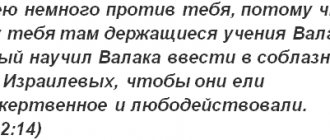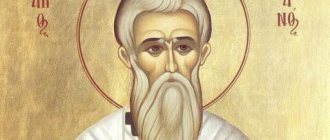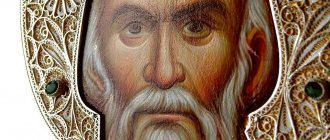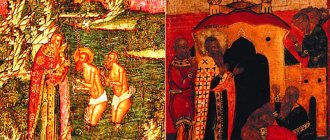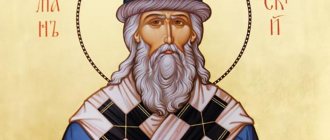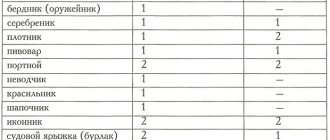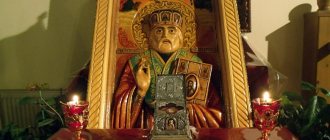Childhood and origins
Saint Ignatius (in the world - Dmitry Aleksandrovich Bryanchaninov) was born on February 17, according to the new style, 1807 in the Vologda district in the village of Pokrovskoye. He came from an ancient noble family. His father was previously close to the court, but then “settled” in the countryside, becoming a landowner. His mother was a well-educated woman. Having married early, she devoted all her energy to her family. In addition to Dima, there were eight more children in the family.
Dima received a good education at home. At first, he and his sisters and brothers studied at home, as is customary in rich families. The boy was different from everyone else in his intelligence and desire to learn, as well as his piety. Dima spent a lot of time in prayer and loved going to church. From an early age, he developed a desire to become a monk, to serve the Lord through virginity and prayer.
However, his family, having learned about his intention, did not approve of him, although they were believers. It is difficult to say what was the basis for their protest. Maybe the parents were afraid to be left alone in old age, or maybe, knowing about his abilities in science, they wanted to see a scientist in their son.
Prayer
O great and wonderful servant of Christ, Holy Hierarch Father Ignatius! Graciously accept our prayers, offered to you with love and gratitude! Hear us, orphans and helpless, who fall to you with faith and love and your warm intercession for us before the Throne of the Lord of Glory asking. We know that the prayer of a righteous man can do much, propitiating the Lord. From the years of infancy you have passionately loved the Lord, and having desired to serve Him alone, you have counted all the red of this world as nothing. You have denied yourself and taken up your cross; you have followed Christ. You chose the narrow and regrettable path of monastic life for yourself, and on this path you acquired great virtues. With your writings you filled the hearts of people with the deepest reverence and humility before the Almighty Creator, and with your wise words you taught sinners who had fallen in the consciousness of their insignificance and their sinfulness, in repentance and humility to resort to God, encouraging them with trust in His mercy. You rejected none of those who came to you, but you were a loving father and a good shepherd to all. And now do not leave us, who fervently pray to you and ask for your help and intercession. Ask our man-loving Lord for mental and physical health, confirm our faith, strengthen our strength, exhausted in the temptations and sorrows of this age, warm our cold hearts with the fire of prayer, help us, purified by repentance, to receive the Christian death of this life and into the palace of the Savior adorned come together with all the elect and there together with you worship the Father and the Son and the Holy Spirit forever and ever. Amen.
Dmitry's youth
When Dima was fifteen years old, his parents took him to an engineering school in St. Petersburg. The father wanted his son to become a military engineer. Dima did not dare to disobey his father. Thanks to his high mental abilities, he passed all exams with “excellent marks” and entered straight into the second year. But the thought of monasticism did not leave him. He was waiting for the right time to make his dream come true.
The young man studied very well. For his successes, he was even introduced to Prince Nikolai Pavlovich, general of the engineering troops. Two years later, Dmitry received the rank of ensign. Thanks to his abilities and origin, the young man shone “in high society.” He had a good oratorical gift. Many listened to him with attention.
The young man met talented people of that century: the composer Glinka, poets Pushkin, Krylov, Zhukovsky, etc. He had all the potential to make a good career and shine in the world, but he was still occupied with the thought of serving God.
Therefore, during the summer holidays, Dmitry went to monasteries: Alexander Nevsky Lavra, Valaam. There he met Elder Leonid and confirmed his desire to leave the world. The parents, having learned about this, ordered strict supervision over their son.
After graduating from college, Dmitry submitted his resignation, which was rejected. At this time he was diagnosed with tuberculosis. In such a state of health there was no talk of monasticism. Therefore, he was advised to leave to serve in a warm climate. He was sent to serve in the Dinaburg fortress on the Western Dvina.
The beginning of monasticism
In 1827, Dmitry still managed to retire. Against the will of his parents, he went to the Alexander-Svirsky Monastery. There he worked as a novice in the refectory and bakery. His confessor was Elder Lev.
Following him, the young novice went to Optina Pustyn. At that time, he felt his health deteriorating and therefore returned home for a while. His parents tried to dissuade his son from becoming a monk, but he was adamant.
Dmitry first entered the Semigorod Monastery, and then went to the Sosnovetsky Monastery. At twenty-four he was tonsured a monk with the name Ignatius in honor of Saint Ignatius the God-Bearer. Soon he was ordained a hierodeacon, and then a hieromonk. Then he was sent to the Lopotov Monastery to restore it and was elevated to the rank of abbot.
By that time, the parents had come to terms with their son’s choice and made peace with him. Due to deteriorating health, Ignatius was sent to the Ugreshsky Monastery as abbot. But the Emperor himself ordered him to head the Trinity-Sergius hermitage in St. Petersburg. There he was elevated to the rank of archimandrite. He was appointed dean.
Saint Ignatius, in the world Dmitry Alexandrovich Brianchaninov, came from an old noble family, which gave Russia many faithful servants of the fatherland and the throne.
Its ancestor was the boyar Mikhail Brenko, squire of the Grand Duke of Moscow Dmitry Ivanovich Donskoy. The chronicles tell that Mikhail Brenko was the same warrior who, in the garb of the Grand Duke and under the princely banner, heroically died fighting the Tatars on the Kulikovo Field. The father of the future saint, Alexander Semyonovich Brianchaninov, was remembered by his contemporaries most for the fact that he was a page at the court of Emperor Paul I. Being a privileged institution, the Corps of Pages raised the children of noble nobles along with the children of the august family. The tastes, manners, habits and morals acquired here left in the soul of Alexander Semenovich the stamp of bright aristocracy, which remained with him throughout his life. His wife was Sofya Bryanchaninova, the daughter of Afanasy Matveevich Bryanchaninov, who was distinguished by his poetic talent and was in close friendship with the poets M.N. Muravyov and K.N. Batyushkov. In their marriage, by the will of fate, two branches of the Bryanchaninov family, which separated in the middle of the 17th century, were united. Sofya Afanasyevna, according to the recollections of her relatives, was a beautiful secular woman who received a good education. She was equally fluent in Russian and French and was fond of poetry, especially French. Semyon Alexandrovich and Sofia Afanasyevna had 16 children, but seven of them died in infancy at different times and for various reasons. After the death of the first two, the young couple remained childless. Deeply lamenting the prolonged childlessness, the couple turned to God's help. “They undertook a journey to the surrounding holy places,” say the closest disciples of St. Ignatius, “in order to obtain permission for their infertility through fervent prayers and charity. The pious enterprise was crowned with success: the fruit of the prayers of the grieving spouses was a son, named Dimitri, in honor of one of the first miracle workers of Vologda - the Venerable Dimitri of Prilutsky" [22, p. 7]. Dmitry was born on February 5 (hereinafter all dates are given according to the old style) 1807 in the family estate of his father, the village of Pokrovsky, Gryazovets district, Vologda province. Their next child was Alexandra (born 1808) married to Gendre, then the closest in spirit to her older brother Peter (born 1809), endlessly loved by Dmitry Sophia (born 1810) - Boborykina, Mikhail (born 1811), Elizaveta (born 1813) - Parensova, Alexander (born 1814), Semyon (born 1815) and Maria (born 1817) - Kupreyanova. The main rule of upbringing in Pokrovskoye was strictness. In Alexander Semenovich, recalls his granddaughter A. Kupreyanova, “tact and significant education with despotism” strangely coexisted [27, (N4), p. 652]. And let’s add: religiosity. According to eyewitnesses, Alexander Semyonovich always stood until the end of the liturgy and after that carried the prosphora given to him in his hands with his head uncovered to his home. Of course, the distance is small, but the technique and custom are characteristic [36, p. 21]. Sofya Afanasyevna dearly loved her eldest son, distinguishing in him a mature mind beyond his years and rare beauty. Love for children, however, was carefully hidden in Pokrovsky as an unacceptable weakness, notes A. Kupreyanova [27, (N4), p. 652]. The education of the young Brianchaninovs was excellent at that time. The head of the family spared no expense for this, hoping, not without a sense of ambition, to see his sons in honorable public service. In his house he kept a rich library. Every day the crew brought the best teachers from the city; two teachers and a governess lived permanently. Much attention was paid to the arts, because in a talented family, some had a penchant for music, others for literature or painting. From childhood, Dimitri showed many-sided abilities: in addition to ordinary activities, he practiced calligraphy, drawing, musical singing, and playing the violin. The boy learned to read early, and his favorite book was “The School of Piety,” which told in simple and clear language about the lives and exploits of ancient Christian saints. Vivid images of holiness had a huge influence on his impressionable soul. Dmitry's religious mood was evident from early childhood and grew stronger over time. In his free hours, he indulged in his favorite reading and writing exercises, in which his talent also manifested itself. At the same time as caring for broad education, strict discipline reigned in the Brianchaninovs’ house. A lot was demanded from the children, but a lot was given to them. A swing and beautiful winter mountains in the garden, rafts on the pond were built for them; they were allowed horseback riding and hunting with their father. They generously used the fruits of their luxurious home garden. The beauty of nature served as a considerable consolation for their refined natures. The main joy for the brothers and sisters in Pokrovskoye was faith. In the Gospel and prayer they found joy, strength to endure, and devotion to duty. “A harsh upbringing,” writes their niece, “played for them the role of that heavy hammer that “breaking glass, forges damask steel.” It forged from them people of strict honesty and a serious attitude towards life...” [27, (N4), p. 659]. Of their five brothers who lived to adulthood, only Semyon Alexandrovich remained in the world until the end of his life (+1863). Years passed. By the end of the summer of 1822, Alexander Semenovich took his eldest son to St. Petersburg to continue his education. On the way, he asked what type of service he would like to choose for himself. “Serving the King of Heaven,” the son answered without hesitation. Such a decisive confession, however, was ignored by the father at that time [27, (N5), p. 9]. In the capital, young Bryanchaninov brilliantly passed the entrance exams to the Main Engineering School and, with significant competition, was the first to be immediately enrolled in the second grade. From the first day, Dmitry’s handsome appearance and excellent training in the sciences attracted the attention of the future Emperor Nikolai Pavlovich, who then served as inspector general of engineers. He invited the young man to the Anichkov Palace, where he introduced him to his wife Alexandra Feodorovna. From that time on, Brianchaninov became the Grand Duchess's boarder. During his years of study, the young man was the first student, distinguished by rare modesty, sincere piety, and enjoyed the universal love of his teachers and fellow students. The height of Brianchaninov’s moral influence on his schoolmates is evidenced by the story of N.S. Leskov “Unmercenary Engineers”, written based on the impressions of contemporaries of those years. Dmitry Alexandrovich was a welcome guest in many high society houses. Family connections brought him to the house of the President of the Academy of Arts and member of the State Council A. N. Olenin. Here, at literary evenings, Brianchaninov was a favorite reader and reciter. With his literary and poetic talent, he won the favorable attention of Pushkin, Krylov, Batyushkov, and Gnedich. “Such a society,” write the saint’s biographers, “of course, had a beneficial influence on the literary development of the future writer. Until the end of his life, Right Reverend Ignatius spoke sympathetically about the advice that some of these individuals gave him at that time” [22, p. 12]. Among the visitors to Olenin’s house were the sons of N.N. Muravyov (senior), with whom Brianchaninov entered into friendly relations, despite their older age. Over the years, for Mikhail Nikolaevich and Nikolai Nikolaevich, he became not just a close friend, but also a wise spiritual mentor. The relationship between the saint and N.N. was especially warm. Muravyov-Karsky, as evidenced by their 20-year correspondence [38, p. 103]. Within the walls of the school, Dmitry turned to science with fiery zeal. He diligently studied chemistry, physics, geodesy, geography, philosophy, literature, linguistics and other subjects. Now, he admits, the boundaries of human knowledge have appeared before his eyes, meanwhile, not a single science has given him a positive answer to the most important questions for humans about the meaning of life, death and immortality. “For a satisfactory answer, for an answer that is essentially necessary, vital, I turn to faith. But where are you hiding, true and holy faith? I could not recognize you in fanaticism, which was not imprinted with evangelical meekness; he breathed with fervor and exaltation! I could not recognize you as an arbitrary teaching, separating from the Church, forming its own new system, vainly and arrogantly proclaiming the acquisition of a new, true Christian faith, after 18 centuries after the incarnation of God the Word” [12, vol. 1, p. 556-559]. The young seeker of truth sought to find living, experienced knowledge in religion, and after much torment, perplexity and doubt, he finally found what he was looking for in the writings of the holy fathers of the Orthodox Church. Reading the Fathers convinced him with complete clarity that salvation in the depths of the Russian Church is undeniable, something that the religions of Western Europe lack, as they have not preserved either the dogmatic or moral teaching of the primacy of the Church of Christ in its original integrity. It revealed to him what is the fall of man and what is his salvation. “It kept telling me: I must develop, feel, see salvation in myself, without which faith in Christ is dead, and Christianity is a word and a name without its implementation!” [12, vol. 1, p. 559-561]. At this time, Dmitry Brianchaninov became closely acquainted with the monks of the Valaam courtyard and the Alexander Nevsky Lavra. Spiritual reading and edifying conversations with monks, especially with the later famous Optina elder Leonid, finally persuaded him to enter a monastery. First, however, the sincerity of his aspirations was severely tested. Having managed to make sure that his son’s monastic moods were not just a whim, Alexander Semenovich turned to the head of the school, Count Sivers, with whom he had a close friendship, and asked to strengthen supervision over Brianchaninov. Parents did not even allow the thought of the unknown, devoid of fame and honor, future of their child, gifted more than other children. The school authorities took their own measures: Dmitry Alexandrovich was transferred from a private apartment to the walls of the Mikhailovsky Engineering Castle. They began to strictly monitor him. Using his connections, Alexander Semenovich also ensured that the St. Petersburg Metropolitan Seraphim himself severely reprimanded the Lavra confessor Afanasy, who, according to rumors, forcibly persuaded the cadet to become a monk. He was forbidden to accept Brianchaninov for confession. Only Dmitry’s personal explanation with the Metropolitan softened the latter and he canceled this strict measure. Will D.A. Brianchaninova was still adamant. Having graduated from the Engineering School with the rank of lieutenant and with the highest number of points, in 1826 he submitted his resignation. As soon as Nicholas I became aware of him, he instructed his brother, Grand Duke Mikhail Pavlovich, to convince his beloved pupil to abandon his intentions. Biographers talk about what happened like this: at the beginning of January 1827, D. Brianchaninov was demanded to the palace, where by that time all the school authorities had been assembled. A 19-year-old young man soon appeared before the powers that be. The Grand Duke informed him that the sovereign, knowing about his academic success, instead of resigning, intended to transfer him to the guard in a position that would satisfy the pride and honor of the young nobleman. Citing a lack of funds, Dmitry said that he could not serve in the guard. “The sovereign deigns to take care of this,” the prince interrupted. “My disordered health,” continued the young man, “which His Majesty knows from the reports of the doctors who treated me, makes me completely unable to carry out official work, and, foreseeing my imminent death, I must take care of preparing myself for eternity, for which I choose monastic rank." “It is much more honorable to save your soul while remaining in the world,” the Grand Duke noted and added that he could be given service in the southern climate of Russia. D. Brianchaninov stood his ground: “To remain in the world and wish to be saved is, Your Highness, the same as standing in a fire and wishing not to burn.” The prince's convictions were shattered against his imperturbable firmness. Having exhausted both affection and threats, Mikhail Pavlovich finally announced the tsar’s highest will to refuse his dismissal. By order of his superiors, Brianchaninov was obliged to leave for the Dinaburg fortress within 24 hours. Thus began a short service as part of the engineering team. Poor health, then a serious illness in a damp and cold climate made him unable to carry out his duties. In the autumn of 1827, Mikhail Pavlovich, who personally visited the Dinaburg fortress, was convinced of this. The longed-for dismissal from service was finally received. Dmitry Alexandrovich immediately perked up. Having recovered from his illness, he went to the Alexander-Svirsky Monastery of the Olonets province to the elder Leonid (Nagolkin), after whom he subsequently moved to the Ploshchanskaya hermitage in the Oryol province, and then to the Optina hermitage. Everything happened without the knowledge or consent of the parents. When they learned that their eldest child had rejected all the prospects for a bright future offered to him, they were indignant. When Dmitry fulfilled his heartfelt desires, becoming a humble and poor novice, all Bryanchaninov’s pride, writes A. Kupreyanova, reared up. Everyone understood that monasticism was not a career for him, not a means of making money, for he always gave away everything he had. The father and mother literally abandoned their son: they not only deprived him of financial assistance, but also stopped writing letters. This caused a deep wound to the sensitive young soul. Archimandrite Pimen left us a verbal portrait of Brianchaninov from that time: “As I see him now: tall, slender and stately, fair-haired, curly, with beautiful dark brown eyes... with a long face; his eyes were intelligent, lively and very pleasant; the beard was just beginning to emerge; in general, his face was very beautiful and attractive” [32, p. 23.69]. The novice Dimitri labored in more than one monastery before the cherished dream of his youth came true. In 1831, Vologda Bishop Stefan, seeing the fiery zeal of the young ascetic, tonsured Demetrius into monasticism and named him Ignatius, in honor of the Hieromartyr Ignatius the God-Bearer. Six days later, on July 4, Monk Ignatius was ordained a hierodeacon, and on July 25, a hieromonk. Seeing the spiritual maturity of Hieromonk Ignatius, His Grace Stephen soon appointed him abbot and builder of the Pelshem Lopotov Monastery, which was already destined for closure. Thanks to the wisdom and energy of the new abbot, the dilapidated monastery was revived in less than two years, both spiritually and economically. At this time, the activities of Father Ignatius became known in St. Petersburg. At the end of 1833, he was summoned to the capital, where he was entrusted with the management of the Trinity-Sergius hermitage with elevation to the rank of archimandrite. Sergius Hermitage was located on the shores of the Gulf of Finland near St. Petersburg. Before Archimandrite Ignatius was appointed there, it had fallen into great disrepair. The twenty-seven-year-old abbot had to combine almost incompatible positions: he was an excellent administrator for the brethren and at the same time a gracious elder-confessor. All this was not easy for him. “By the incomprehensible destinies of Providence,” he would remember later, “I was placed in that monastery... which, when I lived in the capital, I did not even want to see, considering it completely inconsistent with my spiritual goals... The monastery - the Sergius Hermitage - received me inhospitably. In the first year after arriving in it, I was struck by a serious illness, the next year by another, the third by a third: they took away the remnants of my meager health and strength... Here envy, slander, and slander arose and hissed; here I was subjected to severe, lengthy, humiliating punishments, without trial, without the slightest investigation... here I saw enemies breathing irreconcilable malice and a thirst for my destruction...” [12, vol. 1, p. 567]. According to Saint Ignatius, in the Sergius Hermitage he lived through that era during which unbelief and blatant violence, calling themselves Orthodoxy, crushed the dilapidated church hierarchy in Russia, mocking and mocking everything sacred. The results of these actions left their mark on the entire subsequent history of the Russian church. Through his efforts, churches and buildings were rebuilt, agriculture was established, and worship was streamlined. Fr. gave a lot of work and energy. Ignatius for the organization of the monastery choir. In this he was helped by famous Russian composers who deeply revered him: Rev. P.I. Turchaninov, M.I. Glinka, director of the court chapel A.F. Lviv. The range of activities of Archimandrite Ignatius expanded significantly when he was appointed dean of all monasteries of the St. Petersburg diocese in 1838. In 1847 Fr. Ignatius, exhausted by his naturally fragile health, applied for retirement, but instead received a long leave. He went for treatment to the Nikolo-Babaevsky Monastery of the Kostroma Diocese, where he spent 11 months, after which he returned again to the Sergius Hermitage. Archimandrite Ignatius's circle of acquaintances was quite extensive. Bishops, abbots of monasteries, monks and lay people turned to him with their needs. The name of the rector's father was known in all levels of society. He corresponded with many clergy and secular persons. Thus, N.V. Gogol in one of his letters speaks with respect about Fr. Ignatius, and the famous hero of the Crimean War, Admiral Nakhimov reverently accepted the icon of St. Mitrofan Voronezh, sent to him by Archimandrite Ignatius to Sevastopol. His letter to the Russian painter K.P. is very interesting Bryullov. Years flowed. The bodily forces of Father Ignatius were noticeably weak and thoughts to spend the rest of life in solitude appeared more and more often. But in1857, according to the representation of the St. Petersburg Metropolitan Gregory, Archimandrite Ignatius was dedicated to the bishop of Caucasian and Black Sea, which he served for almost four years. It is noteworthy that the newly -associated lord did not even have money to move to Stavropol. Like a true monk, St. Ignatius was completely inexplicable: he spent all his income on the poor. In the dignity of the bishop, Saint Ignatius tirelessly preached and managed to do a lot to arrange the diocese and the spread of Christianity in the Caucasus. He made a lot of efforts to introduce the Ossetian language into the courses of the local seminary: “... we should introduce and develop teaching and other local languages and dialects in the seminary, it was in the types of church benefits of the region, but here they wanted to destroy the teaching of the Ossetian language, to develop the teaching of the French And German, please see the direction! It is not without the initial reason and thought, and not without a goal ”[9, p. 701]. A serious illness, however, did not leave the saint and in the fall1861. His request for dismissal was satisfied. On October 13, along with several loyal students, he moved to the quiet Nikolo-Babaeva monastery already known to him. Among the reasons that prompted him to dismiss, moral was of considerable importance. His direction was admitted, he was recognized as a general direction, including among the bishops: “... in my modernity I could not find a monk who would be a living image of the ascetic teachings of the fathers of the Orthodox Church. Wanting to follow this direction, due to the consciousness of his correctness, put me in an opposition position in relation to everyone and introduced me into the struggle, from which the finger of God, the only finger of God, I was brought to the Babaevsky solitude, if only bred. And on the departed, as you see, they raise their voice, and raise for the same reason - because of evading the teachings of the Holy Church and the adoption of concepts, nasty, even hostile to this teaching ”[9, p. 114]. However, this honest and fundamental position was not believed. In St. Petersburg, many suspected his self -loving planes and searches, and the disease recognized as a guise: “Having no idea about true monasticism, they find monasticism where one hypocrite and hypocrisy and do not see it where it is definitely, or judging by itself, not Understanding even that there may be a search for eternal ”[9, p. 9]. Living at rest, St. Ignatius devoted free time to the revision and publication of his works, many of which were written when he was the rector of the Sergius Desert. On April 16, 191867, on the first day of Easter, Vladyka with great difficulty served the last liturgy and after that he no longer left cell. The death of St. Ignatius followed on Sunday on April 30. On the sixth day after the replacement, the funeral service and burial were performed, which attended up to 5 thousand people, despite the strong off -road in connection with the spring flood. After the deceased hierarch, there was no other inheritance left except for literary works. In the pocket of his cash, 14 kopecks were found. “It was all that he had, because only 2 or 3 days before his death he gave 75 rubles to the peasant who had a horse ... he was a monk ...” - concludes A. Kupyanov [27, N5, p. 16]. Saint Ignatius was glorified in the saints by the Cathedral of the Russian Orthodox Church of 1988. His memory is celebrated on April 30 (May 13). Creation Date: 06/20/2007 09:35:44
Bishop's ministry
In 1857, Ignatius was consecrated bishop. He was sent to serve in Stavropol. He had to raise the diocese from terrible desolation. The Bishop spent a lot of energy fighting schismatics.
The saint devoted a lot of time to creativity. He wrote many spiritual works.
In 1861, due to deteriorating health, Ignatius submitted a request for retirement. It was satisfied and he was given a pension. Ignatius went to the Nikolo-Babaevsky Monastery. There he worked on his books and received visitors.
On Easter 1867, the saint served his last Liturgy . He died on the day of the Myrrh-Bearing Women. It is interesting that all his earthly wealth after death was only a few coins. He was a real unmercenary, a true monk.
Father Ignatius Brianchaninov's father owns two dozen books of spiritual and moral content
After his death, Saint Ignatius Brianchaninov left many works of religious and moral orientation. These are theological works, works of the holy fathers with analysis of the saint, parables, etc. In addition, Ignatius’s works also touch on the epistolary genre, because he corresponded a lot with his spiritual children.
In total, Saint Ignatius Brianchaninov wrote more than 20 books.
Books and works by Ignatius Brianchaninov are sold in the Blagovest online store
Among the most famous works of the saint are the following:
- Ascetic Experiences, vol. I;
- Ascetic Experiences, vol. II;
- Ascetic preaching;
- Letters to the laity;
- On the need for a Council on the current state of the Russian Orthodox Church;
- The future of Russia is in the hands of Divine Providence;
- About signs and wonders;
- The concept of heresy and schism;
- A Word about Man;
- Christian pastor and Christian artist.
Philokalia.
19th century edition. Saint Ignatius Brianchaninov created his works on the basis of the works of the holy fathers included in the “Philokalia” (a collection of spiritual writings of the 4th-15th centuries). The works of Saint Ignatius, published during his lifetime, attract attention with their deep knowledge of the Holy Scriptures and the works of the Holy Fathers of the Orthodox Church, creatively revised and meaningful in relation to the spiritual needs of our time.
Even during their lifetime, they were divided into quotes, for example, the following:
“Humility does not see oneself as humble. On the contrary, it sees a lot of pride in itself. It takes care to find all its branches; looking for them, he sees that there is a lot more to look for.”
All the works of Ignatius Brianchaninov were written with extraordinary literary skill and, despite the fact that only photographs remain of some of their manuscripts, they still represent a valuable tool for everyone who wants to walk the narrow and thorny path of experienced knowledge of God.
By leaving a comment, you accept the user agreement
Works of the saint
The saint left behind a great spiritual legacy, recorded in his books. Wisdom, chastity, purity and love for God are revealed to those who read his works. From them we draw knowledge about prayer, repentance, and pleasing God.
his great book “The Lamentation of a Monk” while still a teenager. His most popular book is “Helping the Repentant ,” which simply and clearly sets out the concepts of human passions and getting rid of them.
His books are also known: “Ascetic Experiences”, “A Lay on Death”, “A Lay on Angels” . The saint paid great attention to remembering death as a source of deliverance from passions. This is written about in the book “A Word on Death.” He also wrote a lot about a dangerous condition called “spiritual delusion.” He wrote many works on monasticism and correct prayer. An entire book is devoted to the teaching of the ranks of angels. There are many books with recorded sermons of the saint delivered at various services.
Prof. Osipov A.I. — about the works of St. Ignatius (Brianchaninov)
Creative heritage
Saint Ignatius left many works of various directions for the edification of believers. Among his published works there are sermons and serious treatises. In addition, many of his messages to private individuals have reached us (see: Selected Letters). He wrote about ascetic life (see: Ascetic experiences, part 1; Ascetic experiences, part 2), and about various issues of Orthodox Dogmatics (see: A Word about Man; A Word about Death. A Word about the sensory and spiritual vision of spirits; A Word about Angels), and against heresies and schisms, and on other topical topics.

